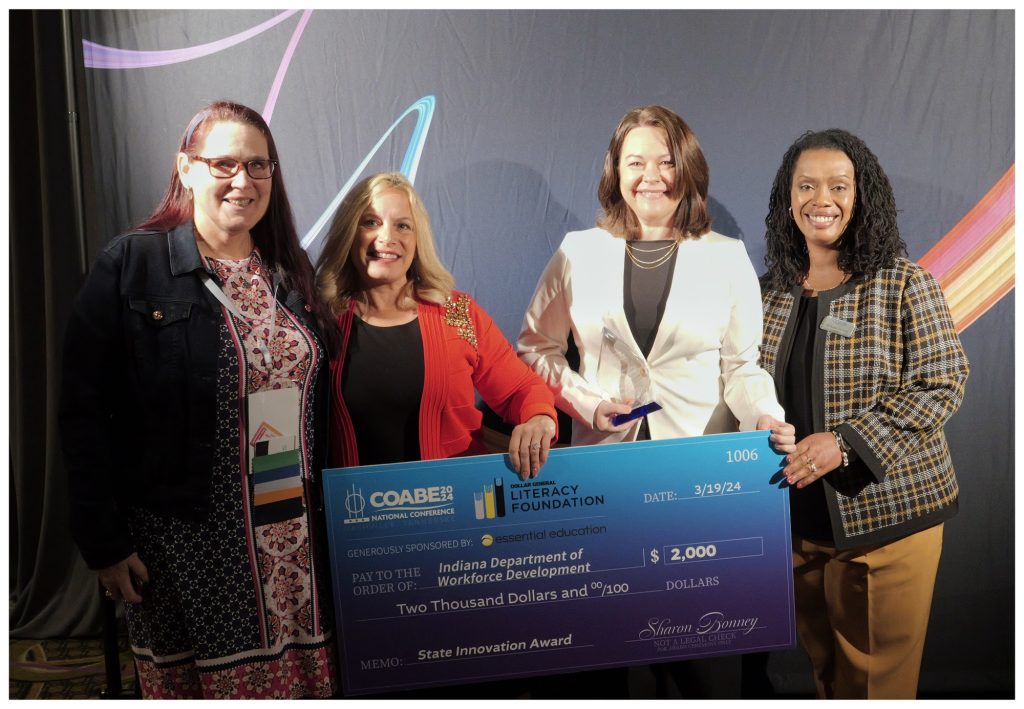DWD receives a prestigious national award from COABE – WBIW
DWD receives a prestigious national award from COABE WBIW.com


Indiana Department of Workforce Development Receives State Innovation Award
The Indiana Department of Workforce Development (DWD) has been honored with the State Innovation Award for its Adult Education “Programs of Excellence” initiative. This prestigious award is presented annually by the Coalition on Adult Basic Education (COABE), the leading national organization dedicated to advancing adult literacy.

Innovation Award from COBAE CEO Sharon Bonney (second from left) and Shaketta D. Thomas (right) during the 2024 COBAE National Awards on March 19, 2024, in Nashville, Tenn.
Promoting Success and Aligning with Goals
The DWD led the “Programs of Excellence” initiative with the aim of promoting the success of adult education programs throughout Indiana and encouraging program administrators to align with existing standards and goals. This initiative is in line with the Sustainable Development Goals (SDGs) set by the United Nations, particularly Goal 4: Quality Education and Goal 8: Decent Work and Economic Growth.
“DWD’s Adult Education team is committed to raising standards that benefit providers and adult learners,” said DWD Commissioner Richard Paulk. “The Programs of Excellence designation specifically spotlights model providers who support Hoosiers as they move to the next level in education, training, and careers. These efforts lead to a stronger workforce that is more prepared and capable of advancing careers.”
Recognizing Model Providers
In October 2023, DWD named 17 providers as the inaugural Indiana Adult Education Programs of Excellence. These providers have demonstrated exceptional commitment to adult education and have made significant contributions to the workforce development in Indiana. The recognition of these model providers aligns with SDG 4 by promoting inclusive and equitable quality education for all.
For more information on the recipients of the Programs of Excellence award, click here.
Impact on Students and Communities
The “Programs of Excellence” initiative has had a significant impact on adult learners and the communities they belong to. Caroline Foster, the adult education manager at Impact Institute in northeast Indiana, shared her experience: “When DWD announced the Program of Excellence criteria, the Impact Institute staff embraced the goals and strived to meet them. We focused on the success of our students and worked together as a team. Recognition for the hard work and dedication of our staff has been great. Impact Institute’s entire team felt proud of this accomplishment.”
By focusing on the success of students and implementing evidence-based program management strategies, Indiana has become a national leader in adult education. The state has consistently achieved high outcomes in terms of student achievements, high school equivalencies earned, integrated education and career training, and employer partnerships. These achievements contribute to SDG 4 by ensuring inclusive and equitable quality education and promoting lifelong learning opportunities for all.
Measuring Strategic Outcomes
The Programs of Excellence initiative is an evolution of Indiana’s evidence-based approach to program management. It measures strategic outcomes and promotes the use of data-informed program management, allowing funders and stakeholders to see the impact of their investment on the workforce and community. This aligns with SDG 17: Partnerships for the Goals, which emphasizes the importance of collaboration and data-driven decision-making for sustainable development.
Expanding Opportunities for Adult Learners
Indiana offers more than 250 adult education class locations, both in-person and online, providing opportunities for adults to increase their skills, learn English, access training, obtain industry-recognized credentials, and secure higher-paying jobs. These opportunities contribute to SDG 8 by promoting inclusive and sustainable economic growth, full and productive employment, and decent work for all.
Recognition and Value of Adult Education
The Program of Excellence award has helped raise awareness of the success and value of adult education programs in Indiana. Todd DeLey, program director of Washington Township Adult Education, expressed his gratitude: “It has been difficult to communicate the success of our program to our school board and district leadership because our metrics differ from K-12. The Program of Excellence award helped district leadership understand how our program performs about state goals and demonstrates the value of what adult education brings to the district and the community.”
About COABE
The Coalition on Adult Basic Education (COABE) is a national organization dedicated to inspiring educators and promoting adult
SDGs, Targets, and Indicators Identified in the Article
1. Which SDGs are addressed or connected to the issues highlighted in the article?
- SDG 4: Quality Education
- SDG 8: Decent Work and Economic Growth
- SDG 17: Partnerships for the Goals
The article highlights the Indiana Department of Workforce Development’s Adult Education “Programs of Excellence” initiative, which aims to promote the success of adult education programs and align them with existing standards and goals. This directly relates to SDG 4, which focuses on ensuring inclusive and equitable quality education and promoting lifelong learning opportunities for all. Additionally, the initiative contributes to SDG 8 by enhancing workforce development and creating opportunities for decent work and economic growth. The collaboration between the Indiana Department of Workforce Development and various adult education providers also demonstrates the importance of partnerships for achieving the SDGs, aligning with SDG 17.
2. What specific targets under those SDGs can be identified based on the article’s content?
- Target 4.3: By 2030, ensure equal access for all women and men to affordable and quality technical, vocational, and tertiary education, including university.
- Target 8.6: By 2020, substantially reduce the proportion of youth not in employment, education, or training.
- Target 17.16: Enhance the Global Partnership for Sustainable Development, complemented by multi-stakeholder partnerships that mobilize and share knowledge, expertise, technology, and financial resources.
The “Programs of Excellence” initiative aligns with Target 4.3 by striving to provide equal access to quality adult education programs for both men and women. It also contributes to Target 8.6 by focusing on improving education and training opportunities to reduce the proportion of youth who are not in employment, education, or training. Furthermore, the collaboration between the Indiana Department of Workforce Development and adult education providers exemplifies Target 17.16, as it represents a multi-stakeholder partnership aimed at advancing sustainable development goals through shared knowledge, expertise, and resources.
3. Are there any indicators mentioned or implied in the article that can be used to measure progress towards the identified targets?
- Percentage of adult learners enrolled in affordable and quality technical, vocational, and tertiary education programs.
- Proportion of youth in employment, education, or training.
- Number of partnerships established between government agencies, educational institutions, and workforce development organizations.
The article does not explicitly mention specific indicators. However, progress towards Target 4.3 can be measured by tracking the percentage of adult learners enrolled in affordable and quality technical, vocational, and tertiary education programs. Target 8.6 can be assessed by monitoring the proportion of youth who are in employment, education, or training. The establishment of partnerships between government agencies, educational institutions, and workforce development organizations serves as an indicator for progress towards Target 17.16.
Table: SDGs, Targets, and Indicators
| SDGs | Targets | Indicators |
|---|---|---|
| SDG 4: Quality Education | Target 4.3: By 2030, ensure equal access for all women and men to affordable and quality technical, vocational, and tertiary education, including university. | Percentage of adult learners enrolled in affordable and quality technical, vocational, and tertiary education programs. |
| SDG 8: Decent Work and Economic Growth | Target 8.6: By 2020, substantially reduce the proportion of youth not in employment, education, or training. | Proportion of youth in employment, education, or training. |
| SDG 17: Partnerships for the Goals | Target 17.16: Enhance the Global Partnership for Sustainable Development, complemented by multi-stakeholder partnerships that mobilize and share knowledge, expertise, technology, and financial resources. | Number of partnerships established between government agencies, educational institutions, and workforce development organizations. |
Behold! This splendid article springs forth from the wellspring of knowledge, shaped by a wondrous proprietary AI technology that delved into a vast ocean of data, illuminating the path towards the Sustainable Development Goals. Remember that all rights are reserved by SDG Investors LLC, empowering us to champion progress together.
Source: wbiw.com

Join us, as fellow seekers of change, on a transformative journey at https://sdgtalks.ai/welcome, where you can become a member and actively contribute to shaping a brighter future.







